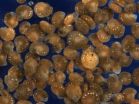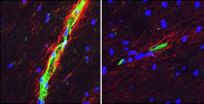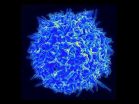(Press-News.org) It is widely accepted that heart muscle cells in mammals stop replicating shortly after birth, limiting the ability of the heart to repair itself after injury. A study published by Cell Press May 8th in the journal Cell now shows that heart muscle cells in mice undergo a brief proliferative burst prior to adolescence, increasing in number by about 40% to allow the heart to meet the increased circulatory needs of the body during a period of rapid growth. The findings suggest that thyroid hormone therapy could stimulate this process and enhance the heart's ability to regenerate in patients with heart disease.
"We not only challenge 120-year-old dogma by showing that cardiac muscle cells are capable of extensive replication well into early preadolescence, but we also identify endocrine and local growth factors that could facilitate this process," says senior study author Ahsan Husain of the Emory University School of Medicine. "In the future, regenerative heart therapies in children may be possible by directly activating replication of cardiac muscle cells, without having to administer stem cells to the heart."
Past research has suggested that heart muscle cells stop dividing by the time mice are about one week old. But the heart grows substantially in mammals between birth and adolescence to accommodate an increase in the growing body's need for oxygenated, nutrient-rich blood. Heart muscle cells grow in size during preadolescence, but only to a limited degree, so the cellular processes accounting for the heart's rapid growth during this period have been unclear.
Shedding light on this mystery, a research team led by Husain, Nawazish Naqvi of the Emory University School of Medicine, and Robert Graham of the Victor Chang Cardiac Research Institute found that preexisting heart muscle cells retain their ability to replicate until well after birth. These cells undergo an intense 24-hour spurt of cell division in preadolescent 15-day-old mice, increasing in number by about half a million or 40%. This process was initiated by a surge in blood levels of thyroid hormone, which activated a signaling pathway known to trigger cell proliferation. Moreover, the ability of the heart to recover after injury was enhanced in the period before adolescence, corresponding to approximately 8 to 10 years of age in humans, compared with later in development.
"The brevity of this proliferative burst could explain why it has previously gone undetected," Graham says. "We may be able to take advantage of this window of opportunity, for example, by giving thyroid hormone to improve repair of the heart in babies born with heart defects, or to reactivate heart muscle cells in adults who experience a heart attack later in life."
INFORMATION:
Cell, Naqvi et al.: "A Proliferative Burst During Preadolescence Establishes the Final Cardiomyocyte Number."
Discovery that heart cells replicate during adolescence opens new avenue for heart repair
2014-05-08
ELSE PRESS RELEASES FROM THIS DATE:
Polar bear genome reveals rapid adaptation to fatty diet
2014-05-08
Polar bears adapted to life in cold Arctic climates in part by relying on a high-fat diet mainly consisting of seals and their blubber. In a study published by Cell Press May 8th in the journal Cell, researchers discovered that mutations in genes involved in cardiovascular function allowed polar bears to rapidly evolve the ability to consume a fatty diet without developing high rates of heart disease. Moreover, the study revealed that polar bears diverged from brown bears less than 500,000 years ago—much more recently than estimates based on previous genomic data.
"In ...
Using genetics to measure the environmental impact of salmon farming
2014-05-08
Determining species diversity makes it possible to estimate the impact of human activity on marine ecosystems accurately. The environmental effects of salmon farming have been assessed, until now, by visually identifying the animals living in the marine sediment samples collected at specific distances from farming sites. A team led by Jan Pawlowski, professor at the Faculty of Science of the University of Geneva (UNIGE), Switzerland, analysed this type of sediment using a technique known as "DNA barcoding" that targets certain micro-organisms. Their research, which has ...
Humans may benefit from new insights into polar bear's adaptation to high-fat diet
2014-05-08
A comparison of the genomes of polar bears and brown bears reveals that the polar bear is a much younger species than previously believed, having diverged from brown bears less than 500,000 years ago.
The analysis also uncovered several genes that may be involved in the polar bears' extreme adaptations to life in the high Arctic. The species lives much of its life on sea ice, where it subsists on a blubber-rich diet of primarily marine mammals.
The genes pinpointed by the study are related to fatty acid metabolism and cardiovascular function, and may explain the bear's ...
Better cognition seen with gene variant carried by 1 in 5
2014-05-08
A scientific team led by the Gladstone Institutes and UC San Francisco has discovered that a common form of a gene already associated with long life also improves learning and memory, a finding that could have implications for treating age-related diseases like Alzheimer's.
The researchers found that people who carry a single copy of the KL-VS variant of the KLOTHO gene perform better on a wide variety of cognitive tests. When the researchers modeled the effects in mice, they found it strengthened the connections between neurons that make learning possible – what is known ...
Penn yeast study identifies novel longevity pathway
2014-05-08
PHILADELPHIA - Ancient philosophers looked to alchemy for clues to life everlasting. Today, researchers look to their yeast. These single-celled microbes have long served as model systems for the puzzle that is the aging process, and in this week's issue of Cell Metabolism, they fill in yet another piece.
The study, led by researchers at the University of Pennsylvania, identifies a new molecular circuit that controls longevity in yeast and more complex organisms and suggests a therapeutic intervention that could mimic the lifespan-enhancing effect of caloric restriction, ...
Study helps explain why MS is more common in women
2014-05-08
A newly identified difference between the brains of women and men with multiple sclerosis (MS) may help explain why so many more women than men get the disease, researchers at Washington University School of Medicine in St. Louis report.
In recent years, the diagnosis of MS has increased more rapidly among women, who get the disorder nearly four times more than men. The reasons are unclear, but the new study is the first to associate a sex difference in the brain with MS.
The findings appear May 8 in The Journal of Clinical Investigation.
Studying mice and people, ...
Immune cells found to fuel colon cancer stem cells
2014-05-08
ANN ARBOR, Mich. — A subset of immune cells directly target colon cancers, rather than the immune system, giving the cells the aggressive properties of cancer stem cells.
So finds a new study that is an international collaboration among researchers from the United States, China and Poland.
"If you want to control cancer stem cells through new therapies, then you need to understand what controls the cancer stem cells," says senior study author Weiping Zou, M.D., Ph.D., Charles B. de Nancrede Professor of surgery, immunology and biology at the University of Michigan Medical ...
What doesn't kill you may make you live longer
2014-05-08
What is the secret to aging more slowly and living longer? Not antioxidants, apparently.
Many people believe that free radicals, the sometimes-toxic molecules produced by our bodies as we process oxygen, are the culprit behind aging. Yet a number of studies in recent years have produced evidence that the opposite may be true.
Now, researchers at McGill University have taken this finding a step further by showing how free radicals promote longevity in an experimental model organism, the roundworm C. elegans. Surprisingly, the team discovered that free radicals – also ...
Population genomics study provides insights into how polar bears adapt to the Arctic
2014-05-08
May 8, 2014, Shenzhen, China – In a paper published in the May 8 issue of the journal Cell as the cover story, researches from BGI, University of California, University of Copenhagen and other institutes presented the first polar bear genome and their new findings about how polar bear successfully adapted to life in the high Arctic environment, and its demographic history throughout the history of its adaptation.
Polar bears are at the top of the food chain, and spend most of their lifetimes on the sea ice largely within the Arctic Circle. They were well known to the ...
How immune cells use steroids
2014-05-08
Hinxton, 8 May 2014 – Researchers at the European Bioinformatics Institute (EMBL-EBI) and the Wellcome Trust Sanger Institute have discovered that some immune cells turn themselves off by producing a steroid. The findings, published in Cell Reports, have implications for the study of cancers, autoimmune diseases and parasitic infections.
If you've ever used a steroid, for example cortisone cream on eczema, you'll have seen first-hand how efficient steroids are at suppressing the immune response. Normally, when your body senses that immune cells have finished their job, ...





